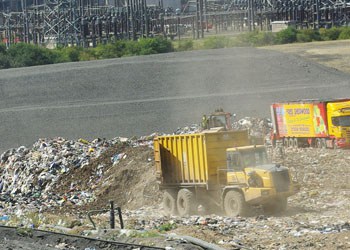The Treasury has today (23 November) restated that it will be pressing ahead with amendments to the definition of ‘taxable disposal’ for Landfill Tax purposes – with the changes to come into effect from 1 April 2017.
The measure – which was first set out in the 2016 Spring Budget – was confirmed today among the tax updates and technical changes to be brought into effect through the 2017 Finance Bill in Chancellor Philip Hammond’s Autumn Statement.
However, the Treasury has not given any long term assurance over future landfill tax rates – with tax rates up to April 2018 having been outlined in March, but no further clarity offered today.
Strategy
Addressing the House of Commons this afternoon, Mr Hammond set out the Treasury’s economic forecast and long-term strategy.
It was the first statement made by a Chancellor since the UK voted to leave the European Union, and the first since Mr Hammond inherited the ministerial post from George Osborne in July.
Economic predictions set out in the Chancellor’s speech show that borrowing is set to be £122 billion higher in the period up to 2021 than forecast in the March Spring Budget – with debt set to rise from 84.2% of GDP to 87.3% this year.
While the waste industry had sought clarification on a range of issues – from maintaining current levels of landfill tax to funding for tackling waste crime – the Chancellor failed to touch on any specific environmental policy in his speech.
Landfill tax
On landfill tax, the Treasury reiterated its pledge to amend the definition of a ‘taxable disposal’ in the 2017 Finance Bill.
The amendment, which was previously confirmed in Mr Osborne’s Spring Budget, will, according to the government, ‘bring greater clarity and certainty for taxpayers on the Landfill Tax liability of activities carried out at a landfill site’.
This follows a consultation in the summer which sought views on amending the definition of a ‘taxable disposal of waste’, as well as views on the tax bracket for hazardous waste disposal (see letsrecycle.com story).
Tweaking the definition will ensure that new activities at landfill sites “are not introduced to undermine the tax” according to the Treasury. It follows a number of legal challenges against HMRC from waste companies arguing the government has not honoured landfill tax rebates on reverse or top layer fluff material used for ‘engineering purposes’.
Infrastructure
The Chancellor also used the Autumn Statement to set out his plans for national infrastructure spending, with central government investment set to rise from £14 billion in 2016/17 to £22 billion in 2020/21.
He assured that economic infrastructure – in the form of transport, energy, flood defences, water, waste, and digital communications – “is at the heart of its economic strategy”.
The investment will be headed by the government’s National Infrastructure Commissions to provide ‘expert advice’ on the country’s strategic infrastructure needs.
Budget
The Chancellor went on to announce that the forthcoming 2017 Spring Budget will be the last, with all future Budgets to be held in the autumn ‘well in advance of the start of the tax year’.
In concluding his speech Mr Hammond said the Autumn Statement “sends a clear message to the world that Britain is open for business as usual”.
He added: “This Autumn Statement responds to the challenge of building on that strength, while also heeding the warnings in the OBR’s figures, as we begin writing this new chapter in our country’s history.”
The post Autumn Statement reaffirms landfill definition tweak appeared first on letsrecycle.com.
Source: letsrecycle.com Waste Managment




